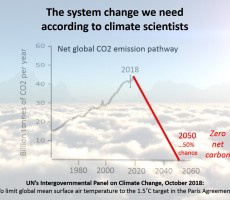News
-
Presentation: Decentralising Energy & Communities

Decentralising Energy & Communities From: Prof. Catherine Mitchell Presentation to: Community Energy in a Climate Emergency – City Hall, London, 27 June 2019 Summary Climate budget and net zero Central role of people System change Governance Coordination Conclusion Download the presentation: CM Energy For London 27 June
Read More » -
The significance of Parliament’s Citizens Assembly on net zero

Viewpoint: The significance of Parliament’s Citizens Assembly on net zero By Dr Matthew Lockwood, Senior Lecturer in Energy Policy, SPRU 20th June 2019 The announcement today from six House of Commons Select Committees that they are to hold a Citizens Assembly (CA) on how we might achieve a pathway to net zero emissions is a major step. The move is clearly inspired by (and made under pressure from) the upsurge of activism on climate change – school strikes, Extinction Rebellion protests, the resurgence of the Green New Deal and the declaration by numerous institutions, including Parliament,
Read More » -
Sign Up for Our Free 4 Week Online Course: Transforming Energy Systems: Why governance matters

The issues of climate change, its impacts, and our collective responses are rising in the consciousness of civil society, industry leaders, and politicians. Last October’s IPCC report on Global Warming of 1.5°C; this month’s CCC report on Net Zero; and declarations of a state of climate emergency at both national and local levels have highlighted the urgency of the issue and the scale of the challenge. Importantly, the challenges are not (just) technical in nature. Rather, there is an urgent need to shift to more effective forms of governance in order to tackle climate change
Read More » -
New Thinking: Where is IGov on net zero?

Where is IGov on Net Zero? Catherine Mitchell – IGov Team, 3rd May 2019 Given all the discussion over the last few days about when the UK and the world should reach net zero, we thought IGov should be clear on where we stand. The CCC has said that the UK ‘should set and vigorously pursue an ambitious target to reduce greenhouse gas emissions (GHGs) to ‘net-zero’ by 2050, ending the UK’s contribution to global warming within 30 years. Reflecting their respective circumstances, Scotland should set a net-zero GHG target for 2045 and Wales should
Read More » -
New Thinking: we have a plan

We have a plan – good governance to achieve a net-zero target Rebecca Willis and Catherine Mitchell, 2nd May 2019 This morning, the Committee on Climate Change recommended that the UK should strengthen its climate change targets, to move Britain to net-zero carbon by mid-Century. The advice, coming the day after the UK Parliament voted to declare a ‘climate emergency’, provides welcome evidence that far-reaching climate action is both feasible and economically sound. Throughout the report, the CCC stresses the crucial role of policy and governance in achieving a transition to zero-carbon. The target will,
Read More » -
Briefing: Enabling the transformation of the energy system

Enabling the transformation of the energy system: Recommendations from IGov Rebecca Willis, Catherine Mitchell, Richard Hoggett, Jess Britton, Helen Poulter IGov, University of Exeter 12th September 2019* Over the next few decades, the UK will need to steer a major transformation of the energy system, in order to maximise the benefits of innovation, bring about rapid decarbonisation in line with the Paris Agreement on Climate Change, and ensure that the system meets all people’s needs. The current picture of governance is confused, with multiple advisory and regulatory bodies, working to different objectives, overseeing different aspects
Read More » -
Submission: Ofgem RIIO2 Methodology

Ofgem: RIIO-2 sector specific methodology consultation Submission from the Energy Policy Group, University of Exeter Catherine Mitchell, Rebecca Willis, Richard Hoggett, Richard Lowes, Rachel Bray, Helen Poulter and Jess Britton Section 1: Introduction and Summary The Energy Policy Group (EPG) of the University of Exeter is pleased to give our comments on Ofgem’s RIIO2 Sector Specific Methodology (SSM). The EPG has previously given its comments on Ofgem’s RIIO Framework Consultation and has written various blogs pressing for more ambition with respect to RIIO2’s environmental output requirements. We have also argued that we find the
Read More » -
Primer – New York State REV

IGov Primer – New York State Reforming the Energy Vision Context Formally proposed in 2014, the New York State Reforming the Energy Vision (REV) is a governance process that IGov has followed closely. Following Hurricane Sandy there was a mandate from the people of New York State to address the energy system. The approach taken was to proactively tear up the rule book to put in place a fit-for-purpose governance for sustainable technologies and new ways of system operation / customer wishes / business models / economic regulation. We think the REV is a fundamentally different
Read More » -
Primer – Energy System Change in Eastern Australia

IGov Primer – Energy System Change in Eastern Australia Context Australia is an example of where the ‘future’ energy system is already happening. This has been driven by a number of factors, which could happen to any country. System transformation is happening at such a rapid pace that the traditional institutional practices have been unable to keep- up with change, causing issues for both the technical and social aspects of transformation. This includes action by the Government and Regulator, with a clear lag between system change and its governance – an issue that is not
Read More » -
New Thinking: GB Policy Conservatism – we are in the vicious policy cycle phase

GB Policy Conservatism – we are in the vicious policy cycle phase Catherine Mitchell – IGov Team, 15th February 2019 Anyone who has read anything that IGov has produced over the last 6 years knows that we argue that GB energy governance, of which energy policy is one part, is not fit for purpose. And on this day of striking schoolchildren and students, it increasingly seems to me that it is not just our infrastructure, regulation, policy and markets which are unfit for purpose but the really big problem is that Britain does not seem
Read More »






